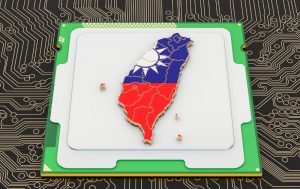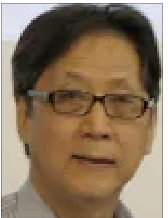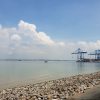US strategists plan to destroy Taiwan’s largest chip manufacturer
Published on June 23, 2023 | by Dr Lim Teck Ghee | johnmenadue.com

Should the US go to war with China, Taiwan’s largest chip maker, TSMC will be the first target to be blown up, according to a strategist at the US Air Force’s Air War College. Not by China, but by the US military.
US Secretary of State, Anthony Blinken, on his visit to Beijing is clearly putting on a show for the world’s media that the US is making efforts to cool down exploding tensions between the two countries.
Shortly before leaving Washington DC, Blinken emphasised the importance of the US and China establishing and maintaining better lines of communication. The U.S. wants to make sure “that the competition we have with China doesn’t veer into conflict” due to avoidable misunderstandings, he told reporters.
Who is responsible for the deterioration in US-China relations and pushing the two into conflict is really not in doubt.
Three prong US strategy to bring down China
Since Trump came into power and now sharply escalated by Biden, the US has used a three pronged strategy, together with allies, to cut China down to a size it feels necessary to ensure its dominant position in the world.
The first prong from the cold war era against communism focuses on US military encirclement and confrontation of China. Today because of the lack of US public support when American casualties arrive home in body bags and the US economy takes a hit from its military expenditure in distant lands, the US is busily engaged in recruiting proxies from the west – and this includes Asian nations such as Japan, South Korea and the Philippines – to fight its war against China. Australia with its tieup with US security policies and military base, and latest procurement of AUKUS submarines will play a key role in whatever anti-China military adventure the US will undertake
The second is the ongoing campaign by picking on issues such as Taiwan, human rights in China, Hong Kong and Xinjiang, the South China Sea and even Russia’s war in Ukraine to demonise China. Blinken should avoid pushing the button on these issues or he will not get anywhere with his Chinese counterpart.
Along the way, the US and its allies have also picked up other news headlines of the day – Peng Shuai, Falun Gong, air quality in Beijing, South China Sea, fatal accidents, Chinese rockets, Chinese food habits, death of a Chinese social influencer – and whatever happening or matter that can be used to generate anti-China and anti-Chinese sentiment to paint a negative image of China to the world. Australia’s media from the Murdoch group has been especially adept at the amplification of the new yellow/red peril messaging.
The third prong – perhaps the most dangerous and consequential – is economic and consists of sanctions against China under the guise of correcting human rights abuses, compelling China to follow international rules and standards, preventing China from alleged coercive action against US allies, etc.
In reality as is clear from the examples of US tariffs on China products, and recent actions against Huawei, ZTE, Tiktok, Xinjiang products, etc. the sanctions are to prevent China’s products from competing and winning market share especially in the high tech sectors.
Related to this, the Australian government’s decision to block Huawei from the country’s 5G roll-out did not arrive from a fact-based, transparent, or equitable decision-making process. It also cannot be seen as serving the nation’s communication or other interest in any way. As “the first country in the world to designate Huawei as untouchable’ and in setting the stage for subsequent policies and actions aimed at impairing China, Australia’s political and security leaders for now may be seen as securing victory. But it may prove to be a very expensive pyrrhic one.
Who is planning to blow up Taiwan’s TSMC?
Today the economic sanctions that US leaders are planning against China are reaching a climax. Jared M. McKinney, a professor with US Air Force’s Air War College, for example, has called for a self-destruct mechanism to Taiwan’s TSMC to be put in place in the event of war.
The TSMC is the biggest chipmaker in the world with a 54% global market share. For the past half-decade, TSMC has been the world’s leader in pattern chips. In the past, TSMC’s chairman has insisted that there is no reason for concern.
“As to the invasion of China, let me tell you,” he declared in 2021, “everybody wants to have a peaceful Taiwan Strait.” Taipei-born, Berkeley-educated, and Bell Labs−trained, Mark Liu has argued that peace in the Taiwan Strait “is to every country’s benefit”. Given the world’s reliance on “the semiconductor supply chain in Taiwan. No one wants to disrupt it.”
Mark Liu is wrong and he knows it though he will not say it.
Already the US is using its bullying and economic coercive power against China to block the sale of advanced memory chips and other computer equipment from Taiwan, Netherlands, South Korea, Japan and the US.
This is the opening shot in the war on chips that the US is undertaking. In his opinion piece for Nikkei Asia, the war-fanning Japanese media giant, Mckinney emphasised the significance of Taiwan’s semiconductor industry and its vulnerability to China’s takeover.
Referring to Democrat Seth Moulton’s comments that the US should “blow up the TSMC” in case of a Chinese invasion, McKinney suggested that rather than the US threaten to bomb TSMC – a hostile act that would result in the US becoming an active belligerent – Taiwan should itself destroy TSMC with the US helping Taiwan’s technicians to leave the country after the act.
Prominent US war hawk, former national security advisor Robert O’Brien and now Ambassador to Taiwan was recently conferred by President Tsai Ing-wen with the Order of Brilliant Star with Special Grand Cordon. He has advocated for US destruction of TSCM as well as other chipmaking fabs in Taiwan comparing such a move to Britain’s decision to sink France’s naval fleet after the country surrendered to Nazi Germany. It is revealing of the political bankrupcy of Taiwan’s government that he has been accorded high honour despite his contemptible and diabolical proposal which will results in thousands of Taiwanese casualties apart from the chipmaking machines.
End game on TSMC
So far such comments have been made to refer to China’s so-called coming invasion of Taiwan which, according to western media accounts drawn from US sources, is supposed to take place soon. Already multiple war games have been played in US Congress, think tanks and other western foreign policy bodies to prepare the US for war with China. In Australia, two of the country’s leading media, the Sydney Morning Herald and The Age splashed the first episode in a three-part series with the headline: “Australia faces the threat of war with China within three years.”
None of western media has a story on how “China faces the threat of war” which is what the US and its allies are pushing and preparing for. Should China and Taiwan work out a future of reconciliation and peaceful reunification, TSMC will be the first target to be blown up – not by China but by the US.
For now, we can expect that conservative, and even liberal, forces in the US and their supporters will sabotage any possibility of peaceful development in China-Taiwan relations and an eventual harmonious reunification. Neither will they allow TSMC to continue operations in a unified China.
If reconciliation or reunification appears on the horizon the destruction of TSMC is almost certainly assured. This explains why the company is frantically engaged in opening up new factories in the US and other parts of the world.
Lim Teck Ghee
 Lim Teck Ghee PhD is a Malaysian economic historian, policy analyst and public intellectual whose career has straddled academia, civil society organisations and international development agencies. He has a regular column, Another Take, in The Sun, a Malaysian daily; and is author of Challenging the Status Quo in Malaysia.
Lim Teck Ghee PhD is a Malaysian economic historian, policy analyst and public intellectual whose career has straddled academia, civil society organisations and international development agencies. He has a regular column, Another Take, in The Sun, a Malaysian daily; and is author of Challenging the Status Quo in Malaysia.








